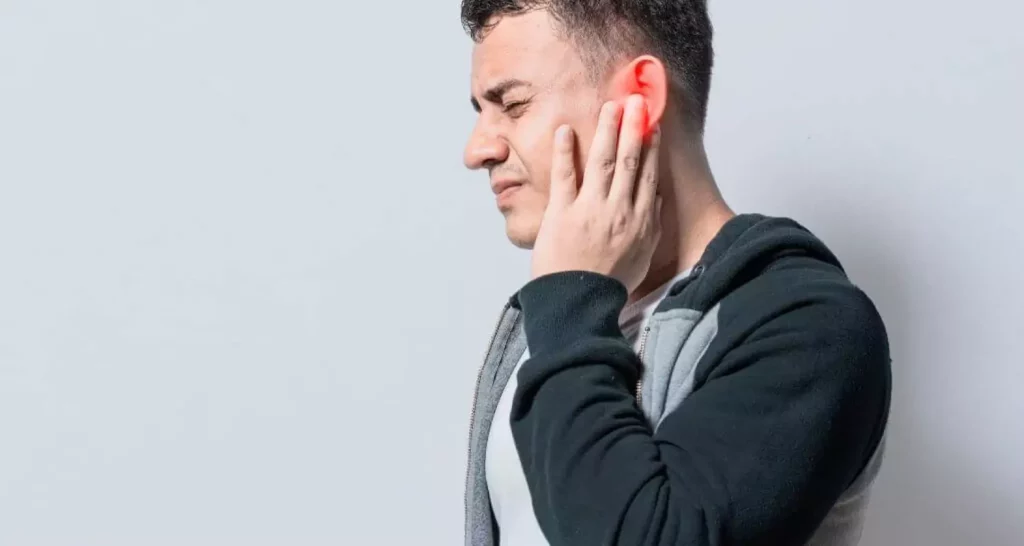Last Updated on: 4th December 2024, 12:11 pm
A toothache is a rather annoying experience that interferes with everyday routine activities. If this discomfort is related to wisdom teeth and is accompanied by a headache (cephalea), it will be uncomfortable and a complex situation to manage. The question is: Can wisdom teeth cause headaches?
The answer to the question is YES.
Wisdom teeth or our third molars erupt between the ages of 17 and 25. They are the last teeth of the dental system and in the eruption process, they may require management.
How can Wisdom Teeth Cause Headaches or Even Migraine?

One way that wisdom teeth cause headaches is when they start to grow, they can put pressure on the eye area, cheeks, and forehead (sinus area). That extra tension is felt around the upper jaw and can trigger a headache or migraine episode.
If the wisdom teeth do not find the space required in the gum, the displacement of other dental pieces is generated, causing an incorrect bite, along with discomfort and a headache or migraine.
If the wisdom teeth erupt in the wrong position, for example emerging at an angle, they can cause an inflammation of the gums, pressure on the nerves of the jaw, and muscle tension in the sinus area, resulting in headache or migraine, or even local pain in the jaw. Other oral health conditions that can cause headaches or migraines are bruxism, periodontitis, wisdom teeth cavities, and cysts.
Migraine: What is it?
A migraine is a headache characterized by a pulsating pain that on some occasions is located on only one side of the head. It increases with movement and may manifest in different phases.
How long does a migraine episode last? It can be between 4 hours and up to 72 hours. The time is variable according to the health condition of the person.
A migraine is one of the most frequent and disabling conditions in the economically active population (22-55 years) and one of the ten diseases that most frequently affects the population worldwide, with a higher prevalence in women. It is estimated that in the United States, about 44 million people experience episodes of migraine.
The World Health Organization (WHO) points out that worldwide, a recurring headache affects about 50% of the adult population. The international organization adds that about half and three-quarters of adults aged between 18 and 65 have experienced a headache in the last year and 30% or more of that population group has suffered from a migraine.
Migraine Symptoms
Any situation that affects the nerves will have a corresponding reaction in the central nervous system. Generally, a migraine presents the following signs:
-
- Throbbing pain on one side of the head
- Increased discomfort with physical activity
- Nausea/dizziness
- Sensitivity to light and noise
The three common headache symptoms linked to wisdom teeth are:
-
- Pain on one side of the neck.
- A headache occurs after eating, a consequence of jaw exercise when chewing food, and pressure on the nerves.
- Tension or excessive pressure on the jaw and headache.
The Treatment for Headaches or Migraine

A wisdom tooth that does not erupt properly has a cavity cyst in the root of the tooth, causes displacement of other teeth, or exerts constant pressure due to a bad location can trigger different and constant adverse conditions for oral health.
The options for the treatment of headache or migraine episodes range from home remedies to surgical management, depending upon the complexity of the case.
Home management of a migraine can take a few days. Some alternatives are:
-
- Place a clove on the area of the pain and keep it there with the jaw closed but do not chew it. It is to be kept until the pain goes down and then discarded. The same treatment can be done by applying clove oil to a cotton ball.
- Tea compresses. The infusion is prepared, and allowed to cool, and the bag is placed on the tooth that causes the pain.
- Chew onion on the side of the mouth where the pain is felt to help reduce any pain.
- Mouthwashes of warm salt water can reduce inflammation and soothe oral pain. In addition, it helps maintain oral hygiene and eliminates bacteria.
- Contrast therapy (hot/cold). Applying an ice pack to the cheeks helps reduce pain and swelling. Heat packs help relax muscles and reduce tension by improving blood flow.
- Take over-the-counter analgesics.
If the incorrect condition of the wisdom teeth is not reversible, the best alternative is extraction. In the days following the intervention, pain, stress, insomnia, or moments of discomfort may occur; these circumstances can lead to an episode of migraine, which evolves during the recovery stage.
The extraction of wisdom teeth allows for the recovery of oral health and integral well-being while avoiding collateral consequences.
Oral health events that can trigger a headache or migraine episode vary. If they are not treated promptly, they can lead to a chronic condition. If the migraine episode is not related to the wisdom teeth, consult your doctor. Note your symptoms such as sensitivity to light and noise, nausea or dizziness, and increased discomfort with physical activity.
Contact us
If you have any questions about this or other topics, you can contact us at Channel Islands Family Dental as well as our page on Facebook. We look forward to your visit and we will make a timely diagnosis. Our dentists in Oxnard, Santa Paula, Ventura, Newbury Park, and Port Hueneme will be able to guide you toward the best treatment to take care of your health and give you back your best smile.
Bibliography
- Beltrán, Miguel (July 10, 2013) Jaw pain / https://www.quironsalud.es/blogs/es/sonrie-favor/dolores-mandibula
- Buse, Dawn C. (November 17, 2016).Understanding Research: What is the American Migraine Prevalence and Prevention (AMPP) Study and What We Have Learned from It? / https://americanmigrainefoundation.org/resource-library/ampp/
- Farnsworth, Carolyn (May 30, 2022).Wisdom Teeth and Migraine / https://www.medicalnewstoday.com/articles/wisdom-teeth-migraine
- Frothingham, Scott (December 12, 2019). Can Wisdom Teeth Cause Headache Pail? /https://www.healthline.com/health/headache-from-wisdom-teeth
- Mayo Clinic (March 10, 2018)Impacted wisdom teeth /https://www.mayoclinic.org/es-es/diseases-conditions/wisdom-teeth/symptoms-causes/syc-20373808
- Mayo Clinic (September 22, 2022)What is a migraine? Explained by a Mayo Clinic expert /https://www.mayoclinic.org/es-es/diseases-conditions/migraine-headache/multimedia/vid-20535928#:~:text=%C2%BFCu%C3%A1les%20son%20los%20s%C3%ADntomas%3F,la%20luz%20y%20al%20ruido.
- Zia, Sherrell (May 13, 2022)How long do migraine attacks last? Symptoms and what to do /https://www.medicalnewstoday.com/articles/es/cuanto-duran-las-migranas



